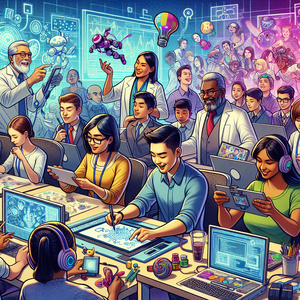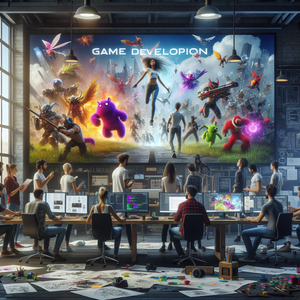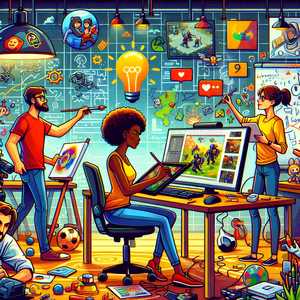
Exploring Career Paths in Educational Game Development: Roles, Responsibilities, and Their Impact on Learning
The realm of educational game development is experiencing significant evolution, driven by a growing need for engaging and interactive learning experiences tailored specifically for children. Platforms like ABCya! illustrate how educational games can bolster foundational skills in subjects such as math and reading while nurturing critical thinking and problem-solving capabilities. This vibrant industry comprises a wide array of roles, including game designers, curriculum developers, and software engineers, each playing a vital part in the creation of tools that enhance learning.
Job Summaries:
Educational Game Designer:
- Educational Game Designers are essential to crafting captivating games that promote learning among children.
- They generate game ideas, develop engaging storylines, and design gameplay mechanics that meet educational goals.
- Collaboration with educators is vital to ensure that the content remains pedagogically sound and suitable for the intended age group.
- A bachelor’s degree in game design, education, or a related field, along with a strong command of game development software, is typically required.
- This role is instrumental in creating enjoyable and educational user experiences.
Curriculum Developer for Educational Technology:
- Curriculum Developers focus on integrating digital games into existing educational frameworks.
- They design lesson plans that incorporate game-based learning aligned with curriculum standards.
- A robust background in education, often necessitating a master’s degree in curriculum development or instructional design, is crucial.
- These professionals also train educators on how to effectively implement these tools, maximizing the educational benefits of platforms like ABCya!
Software Engineer for Educational Games:
- Software Engineers play a crucial role in building the interactive components of educational games.
- This position requires expertise in programming, software architecture, and troubleshooting, usually necessitating a degree in computer science.
- Engineers collaborate closely with designers and artists to ensure smooth gameplay that aligns with the creative vision.
- Familiarity with game engines like Unity or Unreal Engine, alongside knowledge of educational principles, is essential.
User Experience (UX) Researcher:
- UX Researchers are dedicated to understanding how children engage with games to improve usability and enjoyment.
- Their responsibilities include conducting user tests, analyzing feedback, and working with designers to enhance gameplay.
- A degree in psychology, human-computer interaction, or a related field is beneficial.
- The insights gathered from user research are vital in creating games that resonate with young audiences, ultimately enhancing learning outcomes.
Game Artist/Animator:
- Game Artists and Animators are responsible for the visual appeal of educational games.
- They design character models, environments, and animations that are not only attractive but also suitable for young learners.
- A strong portfolio demonstrating artistic talent is crucial, along with proficiency in graphic design software.
- A bachelor’s degree in fine arts or a related field is typically required, making their contributions essential to crafting an engaging aesthetic.
Educational Content Specialist:
- Educational Content Specialists create and curate educational materials for incorporation into games.
- This role entails researching educational standards, developing content, and collaborating with designers to ensure that information is presented engagingly.
- A background in education, usually with a degree in a related field, is essential for this position.
- Ensuring that games deliver accurate and valuable information aligned with established educational goals.
Game Quality Assurance (QA) Tester:
- QA Testers ensure that educational games function correctly and meet quality standards before their release.
- They test gameplay mechanics, identify bugs, and provide constructive feedback.
- Attention to detail and a passion for gaming are critical in this role.
- Typically requires a high school diploma or equivalent, although a degree in a related field can be advantageous.
Marketing Specialist for Educational Games:
- Marketing Specialists develop strategies to promote educational games to schools, parents, and children.
- Responsibilities include creating marketing materials, managing social media campaigns, and conducting market research.
- A degree in marketing, communications, or a related field is generally required.
- Strong communication and analytical skills are essential.
Data Analyst for Educational Technology:
- Data Analysts examine data related to user engagement and learning outcomes from games.
- They analyze trends, create reports, and provide insights that inform game development and marketing strategies.
- A background in statistics, data science, or a related field is typically necessary, requiring a bachelor's degree.
- Their work supports the ongoing improvement of educational games to meet the needs of young learners effectively.
Instructional Designer:
- Instructional Designers focus on creating educational experiences that incorporate games into learning environments.
- They design instructional materials to ensure that educational games align with curriculum goals.
- This role usually requires a master’s degree in instructional design, education, or a related field, as well as experience in e-learning development.
The landscape of educational game development is rapidly evolving, bringing together professionals from diverse backgrounds to create innovative learning tools. Each role, from designers to analysts, works towards a shared objective: enhancing educational outcomes through interactive technology. As the industry expands, so do the prospects for individuals passionate about making a meaningful impact in children's education. By entering this exciting field, you can join a movement that blends creativity, education, and technology, fostering a brighter future for young learners.
Explore More Jobs

